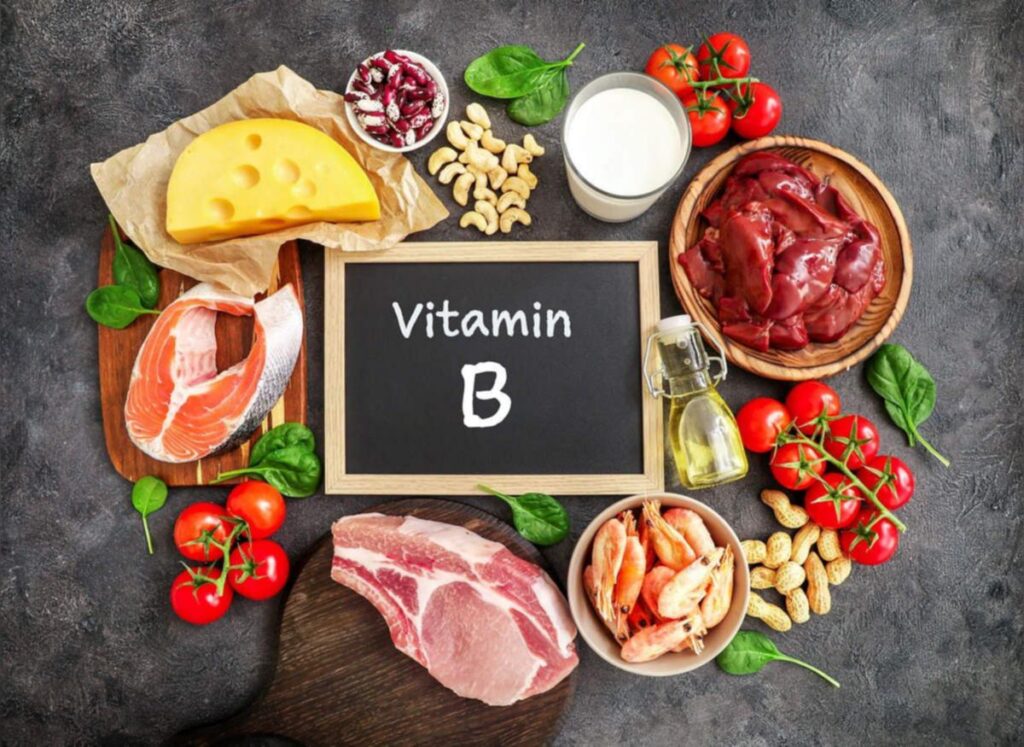Vitamins are a part of our diet which are essential for the body to perform optimally. The deficiency of vitamins certainly causes disorders. It has been clearly observed that supplementing the depleted vitamin leads to preventing or curing of the disease.
Ayurveda and Vitamins:
Vitamins have not been mentioned separately in Ayurvedic texts but the foods that have been regarded as healthy and ideal for daily consumption is found to contain all the essential vitamins and minerals.

What are B Vitamins?
Vitamin B is a water- soluble vitamin that plays an important role in metabolism. There are 8 separate vitamins that are enlisted under Vitamin B. these are chemically different compounds. These are:
- Vitamin B1 – Thiamine
- Vitamin B2 – Riboflavin
- Vitamin B3 – Niacin
- Vitamin B5 – Pantothenic acid
- Vitamin B6 – Pyridoxine
- Vitamin B7 – Biotin
- Vitamin B9 – Folic acid
- Vitamin B12 – Cobalamin
Foods high in B Vitamins are:
- Vitamin B1: Functions of Vitamin B1 are:
- Vitamin B1 or thiamine is responsible for the catabolism of proteins into amino acids.
- It also plays a major role in the muscle contraction and conduction of nerve impulses.
- The deficiency of thiamine leads to a disease known as beriberi.
- Sources of Vitamin B1 are:
- Whole grains
- Legumes
- Meat
- Fish
- Vitamin B2: Functions of Vitamin B2 are:
- Vitamin B2 helps in the proper development of skin, digestive tract lining and supports proper functioning of blood cells and brain.
- The deficiency of Vitamin B2 causes ariboflavinosis. It is characterized by stomatitis, glossitis, conjunctivitis and anemia.
- Sources of Vitamin B2 are:
- Green leafy vegetables
- Milk and dairy products
- Almonds
- Mushrooms
- Broccoli
- Yeast
- Soya bean
- Whole grains
- Vitamin B3: Functions of Vitamin B3 are:
- Vitamin B3 plays a key role in lowering cholesterol and triglyceride levels in the blood.
- It is also important in managing diabetes.
- Severe vitamin B3 deficiency causes pellagra which is characterized by dementia, diarrhoea and dermatitis.
- Sources of Vitamin B3 are:
- Cooked potatoes
- Mushrooms
- Green peas
- Soya milk
- Peanuts
- Avocados
- Brown rice
- Whole wheat
- Vitamin B5: Functions of Vitamin B5 are:
- The function of Vitamin B5 or pantothenic acid is the synthesis of coenzyme A, which is involved in the synthesis of fatty acids and cholesterol.
- It also helps in the production of sex and stress related hormones and production of RBCs.
- The deficiency of Vitamin B5 is rarely seen as it is found commonly in all foods.
- Sources of Vitamin B5 are:
- Whole grains
- Mushroom
- Avocado
- Broccoli
- Milk
- Yogurt
- Soybean
- Vitamin B6: Functions of Vitamin B6 are:
- Vitamin B6 is essential for the metabolism of protein, fat and carbohydrate, synthesis of RBCs and generation of neurotransmitters.
- It also reduces high blood levels of amino acid homocysteine which is linked to depression and other psychiatric disorders.
- It also helps in the production of haemoglobin. Vitamin B6 improves brain function and prevents the onset of Alzheimer’s disease and reduces the risk of heart disease.
- The deficiency of Vitamin B6 causes peripheral neuropathy, depression, confusion, seizures etc.
- Sources of Vitamin B6 are:
- Wheat germ and brown rice
- Soya beans
- Eggs
- Oatmeal
- Wholegrain cereals
- Vitamin B7: Functions of Vitamin B7 are:
- It acts as a coenzyme in the gluconeogenesis.
- It is essential vitamin for skin, hair and nail health.
- Vitamin B7 aids in cell growth and maintains mucous membrane as well.
- Deficiency: The deficiency of Vitamin B7 causes hair loss, fine and brittle hair, cracking in the corners of the mouth, dryness of the eyes, anaemia, lethargy, hallucinations, anorexia, loss of appetite, myalgia etc.
- Sources of Vitamin B7 are:
- Walnuts
- Peanuts
- Cereals
- Milk
- Egg yolk
- Mushroom
- Cauliflower
- Vitamin B9: Functions of Vitamin B9 are:
- Vitamin B9 is vital for making RBCs.
- It enhances brain health.
- It aids in the synthesis and repair of DNA and RNA.
- It also prevents age related hearing loss.
- Vitamin B9 prevents the foetus from developing major congenital deformities of the brain and spine.
- The deficiency of Vitamin B9 causes grey hair, stomatitis, pallor, shortness of breath, anaemia, fatigue, neural tube defects in new born, glossitis etc.
- Sources of Vitamin B9 are:
- Seed kernels
- Spinach
- Lettuce
- Chickpeas
- Peanuts
- Cheese
- Hazelnuts
- Avocados
- Asparagus
- Vitamin B12: Functions of Vitamin B12 are:
- It helps in the synthesis of Red Blood Cells.
- Vitamin B12 is also essential for proper functioning of brain and nervous system.
- The deficiency of Vitamin B causes fatigue, lethargy, breathlessness, headache, pale skin, depression, poor memory, mania, psychosis, headache etc.
- Sources of Vitamin B12 are:
- Fortified breakfast cereal
- Low-fat milk
- Yogurt
- Cheese
- Eggs
- Chicken
- Fish
Thus, B Vitamins are extremely necessary for various functions in the body.
Disclaimer:-
This article is not a substitute to the standard Medical Diagnosis or personalized Ayurvedic Treatment! It is intended only for Information!
For experts consultation, please write us at care@blessayurveda.com.
3,120 total views, 2 views today